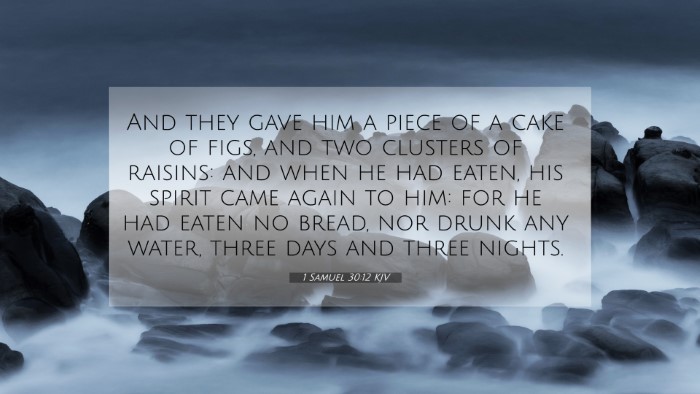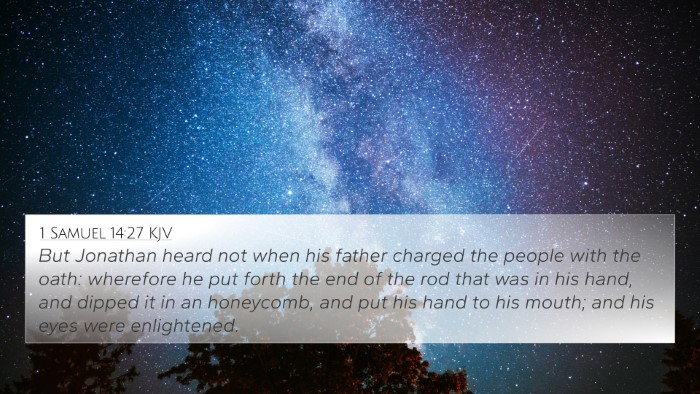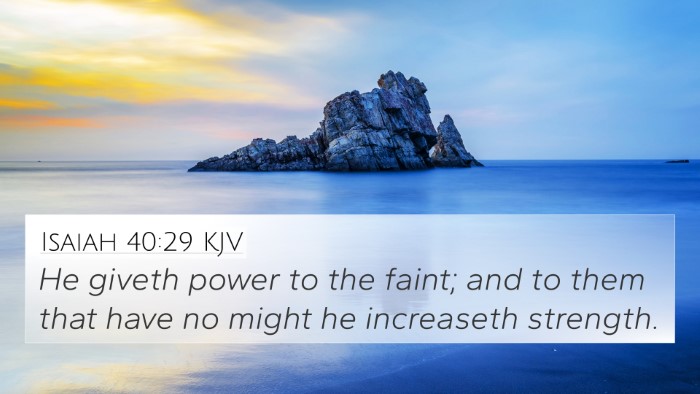Understanding 1 Samuel 30:12
Verse: 1 Samuel 30:12 (KJV) - "And they gave him a piece of a cake of figs, and two clusters of raisins: and when he had eaten, his spirit came again to him: for he had eaten no bread, nor drunk any water three days and three nights."
Summary of Meaning
This verse captures a profound moment where sustenance restores not just physical strength but also mental and spiritual fortitude. David and his men had experienced a harrowing ordeal that left them devastated. The act of providing food to an exhausted man becomes a pivotal moment of recovery and renewed hope.
Commentary Insights
-
Matthew Henry:
Henry emphasizes the importance of compassion and care in this passage. The sharing of figs and raisins was not just about physical nourishment but also symbolized kindness during a time of distress. It shows how simple acts of kindness can uplift a person's spirit, especially after prolonged hardship.
-
Albert Barnes:
Barnes notes that the act of eating revives the man's spirit, indicating that physical sustenance can have spiritual implications. The food represented hope and the restoration of life. Barnes also connects this moment to the broader theme of God’s providence and how He provides for His people, even in their lowest times.
-
Adam Clarke:
Clarke explains that the items given—a cake of figs and clusters of raisins—were considered excellent food and highly nutritious in that context. He underscores that this restoration of health carries greater significance as it marks the beginning of recovery for David and his men after suffering an intense loss.
Bible Verse Cross-References
This verse can be linked to several other passages in the Bible that exhibit similar themes, such as recovery, nourishment, and divine providence:
- 1 Kings 19:5-6: God's provision of food to Elijah in the wilderness.
- Isaiah 40:29-31: God gives strength to the weary and increases power to the weak.
- Matthew 4:4: "Man shall not live by bread alone, but by every word that comes from the mouth of God."
- John 6:35: Jesus as the bread of life, emphasizing spiritual nourishment.
- Psalm 104:14-15: God providing food for animals which can be linked to His care for all creation.
- Matthew 25:35: "For I was hungry, and you gave Me something to eat," highlighting the importance of feeding others.
- Philippians 4:19: "And my God shall supply all your needs according to His riches in glory," emphasizing God’s provision.
Thematic Connections
The connections between this verse and others highlight various biblical themes:
- Compassion and Kindness: Linking the human need for nurturing care in times of distress.
- Physical and Spiritual Restoration: How physical sustenance restores the spirit and evokes a deeper connection to God.
- Divine Providence: God's continuous provision for His people through both spiritual and practical means.
- Hope in Despair: Learning to find hope through simple acts of compassion during painful situations.
Using Cross-Referencing for Deeper Understanding
By engaging in cross-referencing biblical texts, readers can uncover layered meanings within scripture. Here are tips for utilizing cross-references effectively:
- Use a Bible concordance to find key themes and terms that connect verses.
- Employ a cross-reference guide during study sessions to deepen understanding of related scripture.
- Identify links between the Old and New Testament, focusing on shared messages and teachings.
- Conduct a comparative study of parallel passages to discern differences and similarities in context.
- Utilize Bible reference resources to facilitate a more comprehensive engagement with scripture.
Conclusion
The act of feeding the exhausted man in 1 Samuel 30:12 transcends mere sustenance; it illustrates the vital role of compassion, God’s provisions, and the significant impact simple acts of kindness can have on our spiritual journey. As we explore the connections between Bible verses, we unearth deeper truths that enrich our understanding and relationship with the divine.









